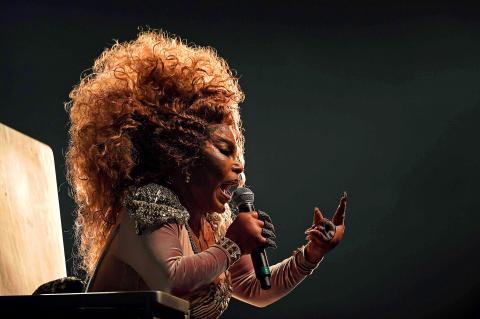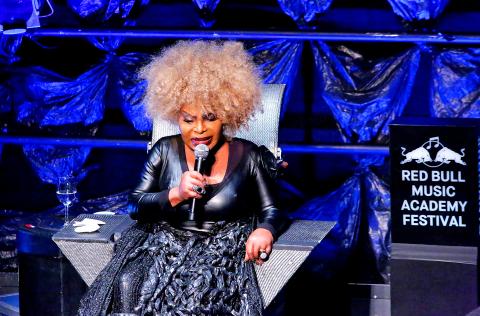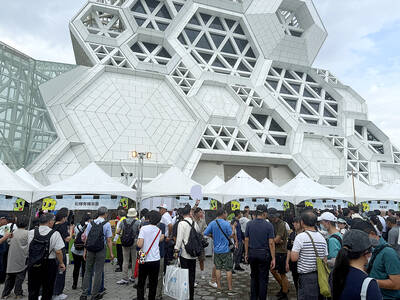Time seems to run at a different pace for Elza Soares. The Brazilian samba legend is 81 but on the eve of a Rio de Janeiro concert for her recent album Deus e Mulher (God is a Woman), you wouldn’t think so.
“Let me tell you, my age has nothing in common with the way I feel,” she said during a phone interview ahead of Tuesday’s show in her native city.
In her unmistakable tone, Soares described herself as excited as ever to be going on stage, even if she now sings seated.

Photo: AFP
“I consider this a good moment, an extraordinary one in my career. I don’t know if it’s the best. The best was when I started. Things are always marvelous when you start,” she said.
Soares’s powerful voice is an integral part of Brazilian music.
She embodied samba and went on to play a major role in cutting edge modern interpretations of the sensual, rhythmic Brazilian sound, mixing in everything from bossa nova to jazz, Afrobeat and funk.

Photo courtesy of wikimedia commons
Her sheer longevity and extraordinarily dramatic personal life — including multiple tragedies and a turbulent marriage to the much-loved footballer Garrincha — have made her nothing less than a national figure.
The self-confidence and dedication to music making that have carried her along that epic road clearly remain intact. Asked if there were any love interests in her life now, she joked: “I’m dating Elza Soares.”
“I’m in love with her, this incredible woman. I’m going to ask to marry her,” she said.

Photo: AFP
‘HURRICANE OF LIFE’
Her latest album, released in May, draws on a recent surge in debates about the role of women in Brazil, where rapes and femicide — the intentional killing of women — are growing.
As a black woman in a Brazil where about half the population identifies as non-white, but power and wealth is concentrated among whites, she carries even more moral authority.
“We live in a country with horrendous prejudices,” she said. “It’s my country, my land and I love it so much, but we almost have no rights. Poor, black, female — what rights are there?”
One of the songs on the album, What is Silent, is dedicated to those fighting for society’s least powerful.
God is Woman follows success with A mulher do fim do mundo (The Woman from the End of the World) in 2015, which won a Latin Grammy for Best Album of Popular Brazilian Music.
The albums have been widely praised for their inventiveness.
Her producer Guilherme Kastrup said that musically Soares hasn’t lost a beat, with a “way of thinking that is very contemporary.”
“She’s a hurricane of life,” he said.
Soares agreed. “I was always very daring, I was never afraid of anything and I’m going forward,” she said.
“I think that’s my triumph. It’s not possible to stay put in one place. If things are bad, then go forward. It’s what I always do.”
Soares said she was cheered by the rise of Brazilian feminism and LGBT activism. “I see women becoming more open, with greater ability to express themselves, to demand more, to ask for their rights,” she said.
“The enslavement of women is over. Without women, you have no world... That’s why God is a woman, God is mother.”
LIVING LEGEND
The phrase “living legend” accurately describes Soares, who apart from her newest album is also the subject of a current musical called Elza, which tells the story of her journey from a tough childhood in a Rio de Janeiro favela to the big stage.
“It was a challenge. I felt the weight of responsibility in developing the role in a way that she would be able to recognize herself,” said Larissa Luz, who plays the singer. “The hardest part was dealing with the sensitive issues, like the loss of a child. But it was magical. I felt she was with me.”
A biography is due out next year.
Soares, though, looks to the moment, not to the past.
“Let me tell you, I don’t make plans. If something happens, that’s because it had to happen,” she said. “I always say I’m in the now. Yesterday’s gone and I don’t know what will be tomorrow. My name is ‘now.’”

Following the shock complete failure of all the recall votes against Chinese Nationalist Party (KMT) lawmakers on July 26, pan-blue supporters and the Chinese Communist Party (CCP) were giddy with victory. A notable exception was KMT Chairman Eric Chu (朱立倫), who knew better. At a press conference on July 29, he bowed deeply in gratitude to the voters and said the recalls were “not about which party won or lost, but were a great victory for the Taiwanese voters.” The entire recall process was a disaster for both the KMT and the Democratic Progressive Party (DPP). The only bright spot for

Water management is one of the most powerful forces shaping modern Taiwan’s landscapes and politics. Many of Taiwan’s township and county boundaries are defined by watersheds. The current course of the mighty Jhuoshuei River (濁水溪) was largely established by Japanese embankment building during the 1918-1923 period. Taoyuan is dotted with ponds constructed by settlers from China during the Qing period. Countless local civic actions have been driven by opposition to water projects. Last week something like 2,600mm of rain fell on southern Taiwan in seven days, peaking at over 2,800mm in Duona (多納) in Kaohsiung’s Maolin District (茂林), according to

Aug. 11 to Aug. 17 Those who never heard of architect Hsiu Tse-lan (修澤蘭) must have seen her work — on the reverse of the NT$100 bill is the Yangmingshan Zhongshan Hall (陽明山中山樓). Then-president Chiang Kai-shek (蔣介石) reportedly hand-picked her for the job and gave her just 13 months to complete it in time for the centennial of Republic of China founder Sun Yat-sen’s birth on Nov. 12, 1966. Another landmark project is Garden City (花園新城) in New Taipei City’s Sindian District (新店) — Taiwan’s first mountainside planned community, which Hsiu initiated in 1968. She was involved in every stage, from selecting

The latest edition of the Japan-Taiwan Fruit Festival took place in Kaohsiung on July 26 and 27. During the weekend, the dockside in front of the iconic Music Center was full of food stalls, and a stage welcomed performers. After the French-themed festival earlier in the summer, this is another example of Kaohsiung’s efforts to make the city more international. The event was originally initiated by the Japan-Taiwan Exchange Association in 2022. The goal was “to commemorate [the association’s] 50th anniversary and further strengthen the longstanding friendship between Japan and Taiwan,” says Kaohsiung Director-General of International Affairs Chang Yen-ching (張硯卿). “The first two editions